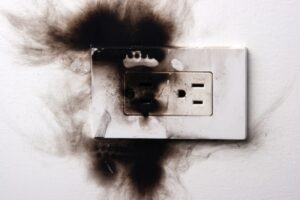We often talk about circuit breakers and electrical panels on our blog because they’re essential parts of household electrical systems. In fact, one of our most important electrical services in Depew, NY and the rest of our service area is helping clients upgrade out-of-date circuit breaker panels.
In this post, we’re going to take the educational approach and provide a short guide to understanding circuit breakers, how they function, the different types, and why they’re essential for home safety.
What Are Circuit Breakers?
Circuit breakers are able to interrupt the flow of electricity in a circuit. When a circuit overloads or there’s a short, the breaker cuts off the electrical flow to protect the circuit.
How They Work
A circuit breaker consists of a switch and a thermal or magnetic mechanism. The breaker has a rate capacity for current, measured in amps. When the current moving through it exceeds that amount, it causes the mechanism to trigger, which opens the circuit to stop electricity from flowing.
Types of Circuit Breakers
There are several types of circuit breakers found in homes:
- Standard Circuit Breakers: Found in electrical panels, these breakers provide protection against overloads and short circuits. They come in various amp ratings for specific circuit or household requirements.
- Ground Fault Circuit Interrupters (GFCIs): GFCIs are designed to protect against electrical shocks in areas where water is commonly used (bathrooms, kitchens). A GFCI trips when it detects that the regular circuit of electricity has been interrupted, which usually means electricity is flowing the wrong way, often through a person.
- Arc Fault Circuit Interrupters (AFCIs): These breakers are designed to prevent electrical fires that can occur because of arcing, i.e. when electricity leaps between wires that are damaged or loose. They’re placed in bedrooms and living areas
- Residual Current Circuit Breakers (RCCBs): RCCBs are used to protect against ground faults and can be found in combination with GFCIs or as standalone devices.
The Importance of Circuit Breakers
Circuit breakers perform a number of crucial functions in a home:
- Fire prevention: Breakers are one of a home’s major defenses against electrical fires because they’ll trip to prevent the circuit overloads that can cause fires.
- High-voltage shock protection: Circuits, specifically GFCI and AFCI, protect people from suffering electrical shocks through outlets and appliances.
- Appliance Protection: Electrical home appliances will last longer when they’re in less danger from power surges or overloads that can damage them.
- Code Compliance: Although the application of the National Electric Code differs from jurisdiction to jurisdiction, almost all require use of specific circuit breaker types in different areas of a home to comply with safety regulations.
Maintaining Circuit Breakers
You can take several steps to keep your circuit breakers working in top condition:
- Regularly test GFCI and AFCI outlets. You can do this by pushing the “test” button found on the outlets when an appliance is plugged in. If the appliance loses power and the “reset” button pops out, the breaker is working.
- Schedule regular electrical inspections with licensed electricians. You can call our team to do this job, and we’ll give you a health report on your electrical system and if you need repairs or upgrades.
- Label your circuit breakers in the electrical panel. This makes it much easier to test and isolate breakers when there’s a problem.
Scherer Electric Is Western New York’s Favorite Electrician! Call us for help with your electrical breakers.






